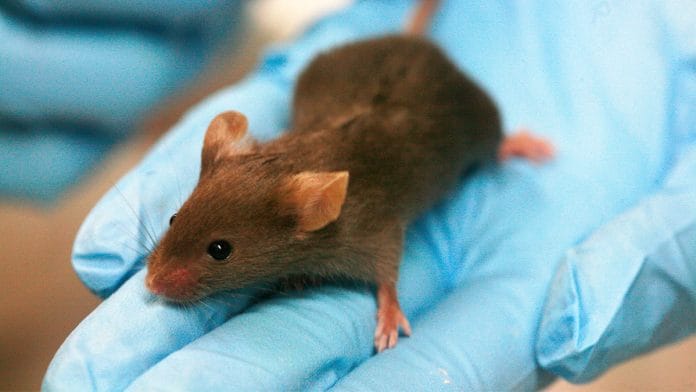New Delhi: The global coronavirus pandemic has claimed over 2,52,000 lives across the world and despite several scientific developments, our understanding of the virus remains incomplete. Research teams from all over the globe are working on filling these gaps in scientific knowledge.
Here are some of the latest research developments in the fight against the global pandemic.
Russian team to create ‘humanised mice’ to test Covid-19 vaccines and drugs
Scientists from the Russian Academy of Sciences and Belgorod University are developing SARS-CoV-2-sensitive mice that can be used as models to test potential Covid-19 vaccines and drugs.
The modified mice will show human-like pathogenesis and symptoms of Covid-19.
To create such a line of mice, researchers have formulated a two-step concept described in the journal Research Results and Pharmacology.
First, the mice will be made biologically safe for routine laboratory practice. This means that the animals will become susceptible to the virus only under certain conditions in the laboratory. This reduces the risk of Covid-19 infection among human staff who breed these mice in non-specialised laboratories.
Then, in order for the mice to be efficient for non-clinical trials, they will need to experience as human-like symptoms and pathogenesis as possible.
The team believes that they have everything necessary to implement this and expect the model mice to be ready as early June 2020.
Also read: Can computers find a potential drug to fight Covid-19? Experts say it’s a long journey
Korean researchers identify two potential drugs against Covid-19
Scientists in South Korea have identified two drugs, approved for treating other illnesses, that show very potent antiviral activity against SARS-CoV-2.
The team screened 48 FDA-approved drugs by testing them in Vero cells, a cell line developed from the kidney cells of an African green monkey, which are commonly used to grow viruses for vaccine production.
The research, published in the journal American Society for Microbiology, shows that a broad-spectrum antiviral drug called niclosamide can help fight Covid-19.
Another antiviral ciclesonide, used to treat asthma and allergic rhinitis, may also control the SARS-CoV-2 infection. This drug not only targets a key viral protein, but may also dampen or prevent cytokine storms, an immune inflammatory overreaction that causes death among Covid-19 patients.
US to study prevalence of coronavirus among children
Scientists in the US are conducting a study to help determine the rate of novel coronavirus infection among children and their family members.
The study, called Human Epidemiology and Response to SARS-CoV-2 (HEROS), will also help determine what percentage of children infected with SARS-CoV-2 develop symptoms of the disease.
Additionally, the study will examine whether rate of Covid-19 infection differs between children who have asthma or other allergic conditions and children who do not.
The US National Institute of Allergy and Infectious Diseases (NIAID) Director Anthony S. Fauci said that while very few children have become sick with Covid-19 compared to adults, it is not known whether this is because children are resistant to infection or whether they do not develop symptoms.
The study team will enroll 6,000 people from 2,000 families in 11 cities. Study participants will include both healthy children and children with asthma or other allergic conditions. The team will follow these children and their families for six months to determine who gets infected with SARS-CoV-2, and whether the virus is transmitted to other family members.
Also read: Can’t understand research jargon around Covid-19? Here’s a basic primer to get you started
Protein may predict which patients will need ventilators
Very high levels of a protein known as suPAR in the blood of Covid-19 patients may be an early indicator of severe respiratory failure, according to a new study.
The findings, published in the Journal of Critical Care, suggests that suPAR could potentially indicate if an infected person will require a ventilator or not.
The team from Rush University Medical Center in US tested soluble urokinase plasminogen activator receptor (suPAR) levels in 15 patients when they were admitted or tested for Covid-19 and followed them in their clinical course. They found that the time to intubation was shorter in patients with a higher plasma suPAR.
According to the researchers, existing scientific literature shows that suPAR is associated with poor outcomes from acute respiratory distress syndrome and poor lung functioning.
They suggest that measuring suPAR as part of diagnosing Covid-19 can help doctors make more timely decisions about the patients that will need critical care.
The findings of the present research raise new questions about the role of suPAR in Covid-related organ dysfunction.
The protein suPAR, is produced in the endobronchial tree in the lungs and by immune cells in the bone marrow and has been shown to harm kidneys. The team has found that chronically elevated levels of suPAR is linked to development of chronic kidney disease and increased risk for acute kidney injury.






